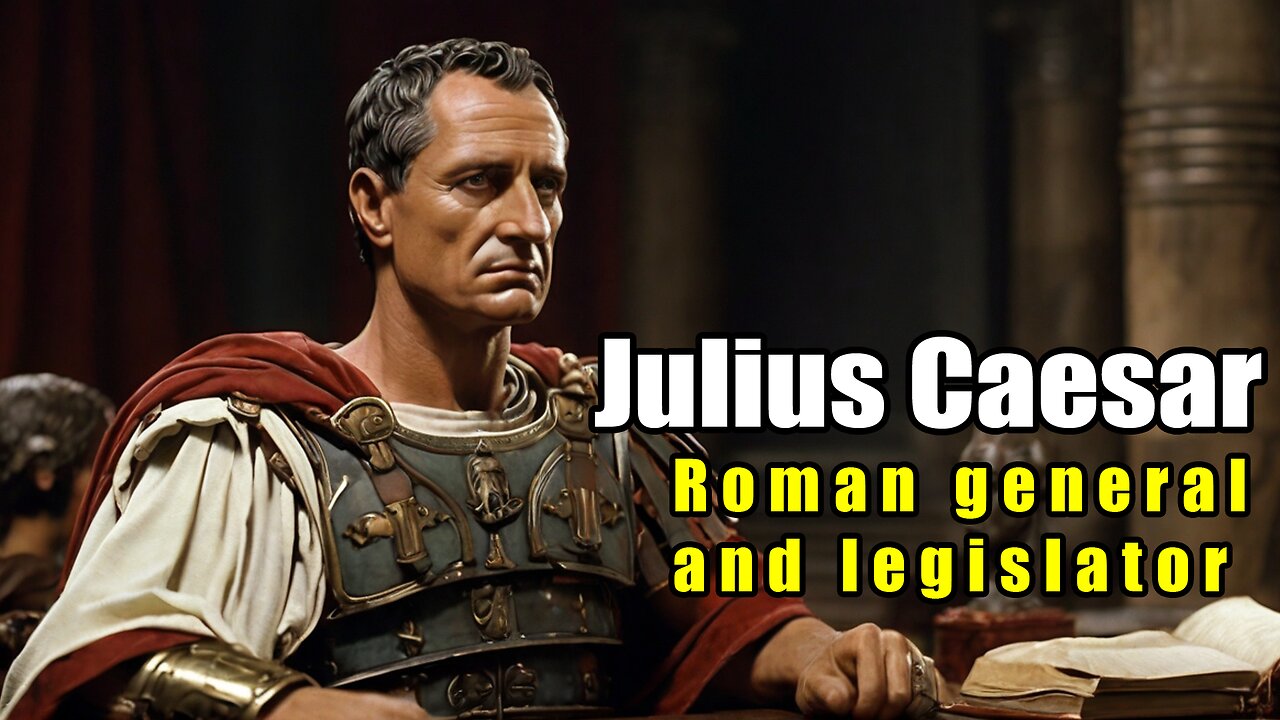Premium Only Content

Julius Caesar - Roman general and legislator (100 - 44 B.C.)
Julius Caesar (100-44 B.C.) was a Roman military general, statesman, and dictator who played a critical role in the events that led to the demise of the Roman Republic and the rise of the Roman Empire. Here is an overview of Julius Caesar's life and his significant contributions to Roman history:
Early Life:
Birth and Family:
Julius Caesar was born on July 12 or 13, 100 B.C., into a patrician family that claimed descent from the goddess Venus. His family, the Julii, was part of the Roman nobility.
Political Connections:
Caesar's family connections proved crucial in his early political career. He was related to prominent figures, including Marius through marriage and Sulla through family ties.
Military Career:
Military Successes:
Caesar rose through the ranks in the Roman military through a series of successful campaigns. Notable among these was his conquest of Gaul (modern-day France and parts of surrounding regions) from 58 B.C. to 50 B.C.
Crossing the Rubicon (49 B.C.):
One of the most significant events in Caesar's life was his crossing of the Rubicon River in 49 B.C., defying Roman law by leading his army into Italy. This act sparked a civil war against the forces of Pompey, his political rival.
Civil War and Defeat of Pompey:
The civil war between Caesar and Pompey culminated in the Battle of Pharsalus in 48 B.C., where Caesar emerged victorious, leading to Pompey's flight to Egypt and subsequent assassination.
Political Career:
Dictatorship and Reforms:
Following his victory in the civil war, Caesar returned to Rome and assumed the position of dictator. He implemented a series of reforms, including land redistribution, granting Roman citizenship to more people, and revising the calendar (introducing the Julian calendar).
Appointment as Dictator in Perpetuity:
In 44 B.C., Caesar was appointed dictator perpetuo (dictator in perpetuity) by the Senate, effectively consolidating his power.
Assassination:
Ides of March (44 B.C.):
On the Ides of March (March 15, 44 B.C.), a group of Roman senators, including Cassius and Brutus, assassinated Julius Caesar at a meeting of the Senate.
Legacy:
End of the Roman Republic:
Caesar's assassination led to a power struggle and a series of civil wars, ultimately culminating in the end of the Roman Republic.
Octavian's Rise to Power:
Caesar's grandnephew and adopted son, Octavian (later known as Augustus), emerged as the principal heir. Octavian, along with Mark Antony, defeated the forces of Cassius and Brutus in the Battle of Philippi in 42 B.C.
Transition to the Roman Empire:
The events following Caesar's death marked the transition from the Roman Republic to the Roman Empire. Octavian became the first Roman Emperor, establishing the Pax Romana (Roman Peace).
Cultural Impact:
Cultural and Literary Legacy:
Julius Caesar's life and deeds have had a profound impact on literature, theater, and art. William Shakespeare's play "Julius Caesar" is one of the most famous literary works based on his life.
Political Lessons:
Caesar's rise and fall serve as cautionary tales about the consequences of unchecked power and the fragility of republican institutions.
Julius Caesar's life was marked by military prowess, political ambition, and transformative reforms. While his actions contributed to the end of the Roman Republic, they also set the stage for the emergence of the Roman Empire and the beginning of a new era in Roman history.
-
 LIVE
LIVE
VladsGamingCartel
1 hour ago7 Days to Die | Vlad & Tippsy Stream #BadAtGaming
193 watching -
 35:38
35:38
Sam Sorbo
1 hour agoLIVE from TPUSA SAS: Fighting for Parents, Freedom, and the First Amendment
1.64K4 -
 16:09
16:09
Professor Nez
1 hour ago🚨BIDEN'S DOCTOR STONEWALLS: What Are They HIDING?
8.77K8 -
 LIVE
LIVE
I_Came_With_Fire_Podcast
10 hours agoThe U.S. is Reverse Engineering UAP Technology Faster Than China
334 watching -
 40:27
40:27
The Rubin Report
3 hours agoThis Democrat Is Willing to Be Honest About How They Lost Their Way | Jim Himes
125K93 -
 52:39
52:39
Her Patriot Voice
3 hours ago $1.81 earnedLIVE From SAS with Savannah Craven
14.2K -
 1:09:27
1:09:27
Wendy Bell Radio
7 hours agoPet Talk With The Pet Doc
22.5K8 -
 8:12
8:12
Sideserf Cake Studio
4 hours ago $0.53 earnedTake the ULTIMATE Real or Cake Challenge
10.2K2 -
 39:26
39:26
SouthernbelleReacts
6 days ago $0.81 earned"Daaaang! My First Time Watching Joe Dirt | Southern Comedy Reaction"
9.79K2 -
 4:14
4:14
Data illusion
5 days ago $0.36 earnedWeapons and their inventors
8.31K1